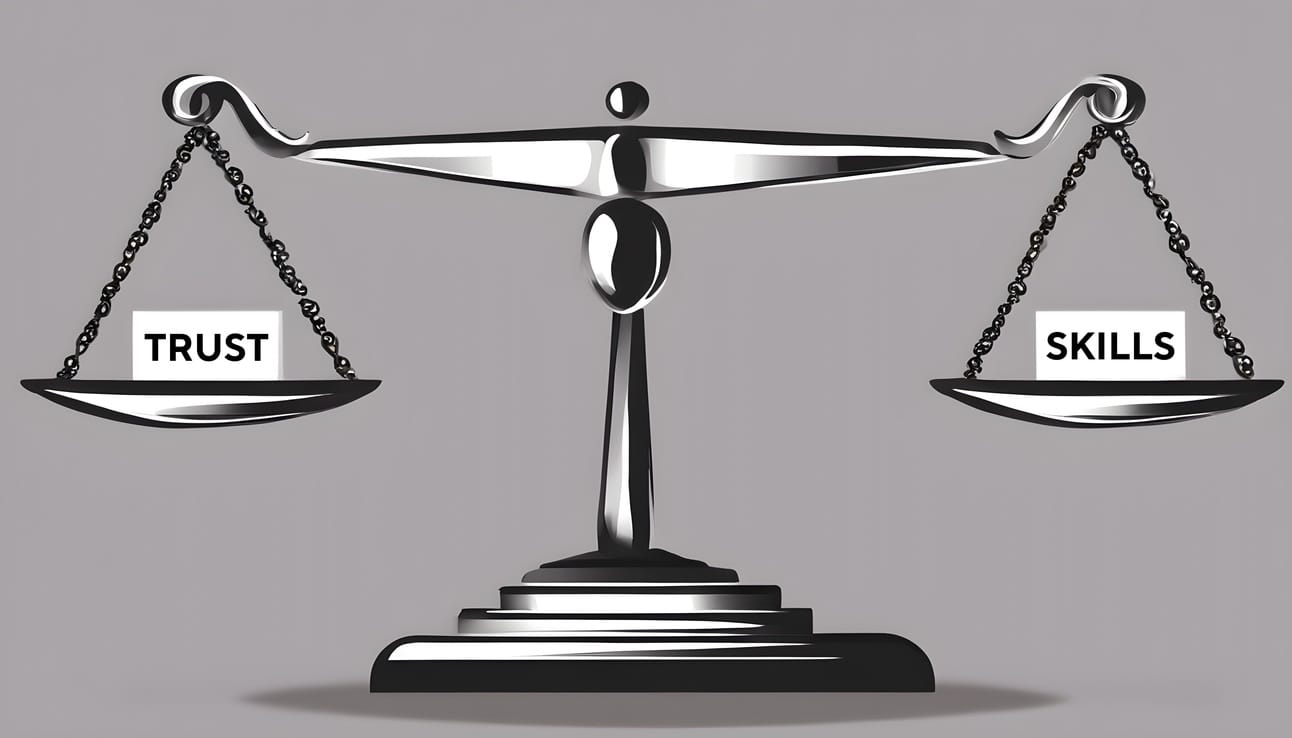- The Captain's Log with Dave
- Posts
- Trust or Skills: What’s More Important When Hiring?
Trust or Skills: What’s More Important When Hiring?
Navigating the Balance Between Reliability and Ability in Your Team

When it comes to hiring, one big question always comes up: Do you hire for trust or skills? Let's dive into this topic and see what works best for building an unstoppable team.
Trust and Skills: The Essentials
Trust is all about believing in someone's reliability, integrity, and capability. It’s the glue that holds relationships together and makes teamwork effective. Trust is earned over time through consistent and honest behavior and is a driving force behind great performance.
Skills, on the other hand, are the abilities and knowledge people pick up through education, training, or experience. Different jobs need different skills, but having a strong skill set is crucial for success and growth in any field.
The magic happens when trust and skills work together. Trusting someone’s abilities can open up more opportunities for them to shine, while strong skills help build trust and credibility.
The Hiring Dilemma
As a leader, you’ve got to think about both trust and skills when hiring. Many leaders go with their gut, choosing someone they trust, often someone they know personally. Big companies, however, tend to focus more on skills and might think assessing trust is too subjective.
Personality Style and Hiring
Personality type can definitely influence hiring decisions. Some personalities just click better with certain roles or environments. Plus, you might naturally relate better to certain personality types.
But here’s the kicker: personality alone doesn’t always predict job performance or success.
Personality traits like honesty, reliability, and responsibility can signal trustworthiness, while drive, initiative, and creativity can indicate high skill potential. Formal assessments like DISC, Motivations, and Trustworthiness can give you deeper insights into a candidate’s personality, skills, and motivations. Just remember, these tools aren't foolproof but can be super helpful in making informed decisions.
Avoiding Hiring Pitfalls
Ever heard of George Santos? His world record setting “resume enhancement” is a classic case of why it’s crucial to trust but verify. Take your time hiring, and be quick to make changes if needed. FocalPoint founder Brian Tracy nails it with, “Hire at leisure, fire in haste.”
Balancing trust and skills can be tricky. Use both subjective and objective assessments to get a full picture of your candidates.
Subjective Assessments: References and interviews give you a feel for a candidate’s past performance and behavior, helping gauge their trustworthiness and teamwork.
Objective Assessments: Skills tests and background checks provide hard data on a candidate’s proficiency and reliability. Skills tests assess technical abilities, while background checks confirm work history and flag any red flags.
Two things that should be non-negotiable but often get glossed over or skipped are reference calls and background checks.
Calling your candidates previous supervisors, peers, and subordinates is essential to understand their full picture as an employee. Definitely do it over the phone, people usually won’t put criticisms in writing. And do your best to find some people NOT on the list of references provided by your candidate.
If your new candidate background checks consist of Googling their name and stalking them on social media, you’re doing it VERY wrong. Professional background check companies exist for a reason. USE THEM.
Ongoing Assessment
Hiring is just the beginning. Keep assessing trustworthiness and skills through regular performance evaluations, feedback, and communication. This helps maintain and grow the trust and skill levels in your team over time.
Reply